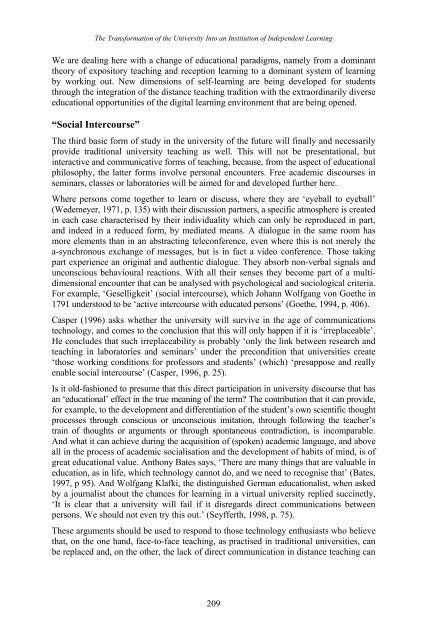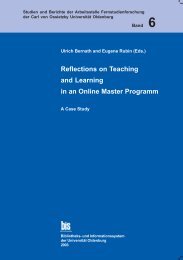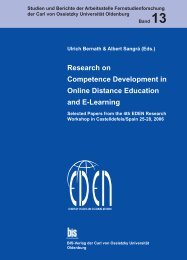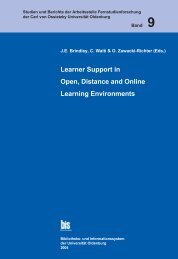Distance Education in Transition - Master of Distance Education ...
Distance Education in Transition - Master of Distance Education ...
Distance Education in Transition - Master of Distance Education ...
Create successful ePaper yourself
Turn your PDF publications into a flip-book with our unique Google optimized e-Paper software.
The Transformation <strong>of</strong> the University Into an Institution <strong>of</strong> Independent Learn<strong>in</strong>g<br />
We are deal<strong>in</strong>g here with a change <strong>of</strong> educational paradigms, namely from a dom<strong>in</strong>ant<br />
theory <strong>of</strong> expository teach<strong>in</strong>g and reception learn<strong>in</strong>g to a dom<strong>in</strong>ant system <strong>of</strong> learn<strong>in</strong>g<br />
by work<strong>in</strong>g out. New dimensions <strong>of</strong> self-learn<strong>in</strong>g are be<strong>in</strong>g developed for students<br />
through the <strong>in</strong>tegration <strong>of</strong> the distance teach<strong>in</strong>g tradition with the extraord<strong>in</strong>arily diverse<br />
educational opportunities <strong>of</strong> the digital learn<strong>in</strong>g environment that are be<strong>in</strong>g opened.<br />
“Social Intercourse”<br />
The third basic form <strong>of</strong> study <strong>in</strong> the university <strong>of</strong> the future will f<strong>in</strong>ally and necessarily<br />
provide traditional university teach<strong>in</strong>g as well. This will not be presentational, but<br />
<strong>in</strong>teractive and communicative forms <strong>of</strong> teach<strong>in</strong>g, because, from the aspect <strong>of</strong> educational<br />
philosophy, the latter forms <strong>in</strong>volve personal encounters. Free academic discourses <strong>in</strong><br />
sem<strong>in</strong>ars, classes or laboratories will be aimed for and developed further here.<br />
Where persons come together to learn or discuss, where they are ‘eyeball to eyeball’<br />
(Wedemeyer, 1971, p. 135) with their discussion partners, a specific atmosphere is created<br />
<strong>in</strong> each case characterised by their <strong>in</strong>dividuality which can only be reproduced <strong>in</strong> part,<br />
and <strong>in</strong>deed <strong>in</strong> a reduced form, by mediated means. A dialogue <strong>in</strong> the same room has<br />
more elements than <strong>in</strong> an abstract<strong>in</strong>g teleconference, even where this is not merely the<br />
a-synchronous exchange <strong>of</strong> messages, but is <strong>in</strong> fact a video conference. Those tak<strong>in</strong>g<br />
part experience an orig<strong>in</strong>al and authentic dialogue. They absorb non-verbal signals and<br />
unconscious behavioural reactions. With all their senses they become part <strong>of</strong> a multidimensional<br />
encounter that can be analysed with psychological and sociological criteria.<br />
For example, ‘Geselligkeit’ (social <strong>in</strong>tercourse), which Johann Wolfgang von Goethe <strong>in</strong><br />
1791 understood to be ‘active <strong>in</strong>tercourse with educated persons’ (Goethe, 1994, p. 406).<br />
Casper (1996) asks whether the university will survive <strong>in</strong> the age <strong>of</strong> communications<br />
technology, and comes to the conclusion that this will only happen if it is ‘irreplaceable’.<br />
He concludes that such irreplaceability is probably ‘only the l<strong>in</strong>k between research and<br />
teach<strong>in</strong>g <strong>in</strong> laboratories and sem<strong>in</strong>ars’ under the precondition that universities create<br />
‘those work<strong>in</strong>g conditions for pr<strong>of</strong>essors and students’ (which) ‘presuppose and really<br />
enable social <strong>in</strong>tercourse’ (Casper, 1996, p. 25).<br />
Is it old-fashioned to presume that this direct participation <strong>in</strong> university discourse that has<br />
an ‘educational’ effect <strong>in</strong> the true mean<strong>in</strong>g <strong>of</strong> the term? The contribution that it can provide,<br />
for example, to the development and differentiation <strong>of</strong> the student’s own scientific thought<br />
processes through conscious or unconscious imitation, through follow<strong>in</strong>g the teacher’s<br />
tra<strong>in</strong> <strong>of</strong> thoughts or arguments or through spontaneous contradiction, is <strong>in</strong>comparable.<br />
And what it can achieve dur<strong>in</strong>g the acquisition <strong>of</strong> (spoken) academic language, and above<br />
all <strong>in</strong> the process <strong>of</strong> academic socialisation and the development <strong>of</strong> habits <strong>of</strong> m<strong>in</strong>d, is <strong>of</strong><br />
great educational value. Anthony Bates says, ‘There are many th<strong>in</strong>gs that are valuable <strong>in</strong><br />
education, as <strong>in</strong> life, which technology cannot do, and we need to recognise that’ (Bates,<br />
1997, p 95). And Wolfgang Klafki, the dist<strong>in</strong>guished German educationalist, when asked<br />
by a journalist about the chances for learn<strong>in</strong>g <strong>in</strong> a virtual university replied succ<strong>in</strong>ctly,<br />
‘It is clear that a university will fail if it disregards direct communications between<br />
persons. We should not even try this out.’ (Seyfferth, 1998, p. 75).<br />
These arguments should be used to respond to those technology enthusiasts who believe<br />
that, on the one hand, face-to-face teach<strong>in</strong>g, as practised <strong>in</strong> traditional universities, can<br />
be replaced and, on the other, the lack <strong>of</strong> direct communication <strong>in</strong> distance teach<strong>in</strong>g can<br />
209





